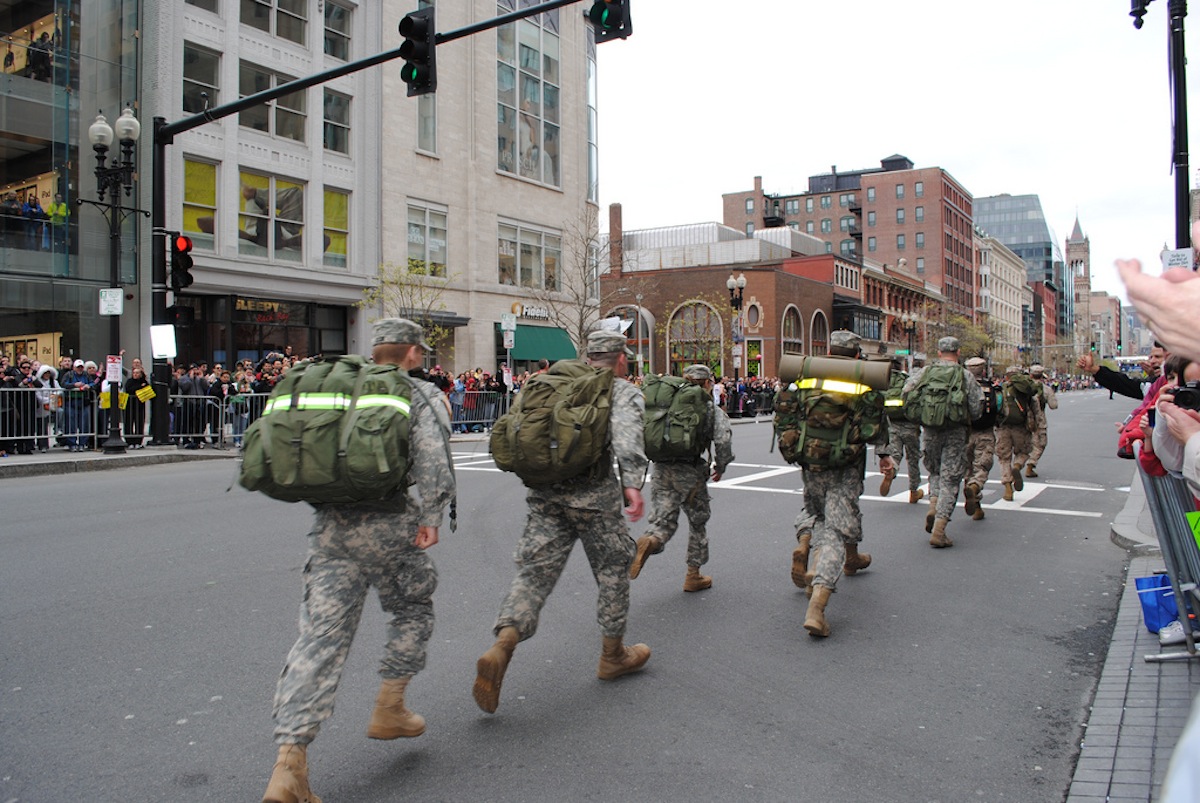When Times Get Tough, Keep on ‘Rucking’
New, stricter security guidelines set for this year’s Boston Marathon will keep active members of the military from trudging the 26.2 mile path from Hopkinton to the finish line, bearing the weight of their 40-pound rucksacks on their backs in support of families of fallen soldiers.
For years, uniformed soldiers have been “rucking” the race route, but according to the Boston Athletic Association’s new rules and regulations, which were crafted as the result of the horrific events that unfolded at last year’s race, “units or groups such as military ruck-marchers and cyclists, who have sometimes joined on the course, will not be allowed to participate.”
The rule change, which previously acted as somewhat of a silent agreement between active military members and race organizers, is part of an effort to keep “props…including sporting equipment and military and fire gear” from entering any marathon venue, including the course and Athletes’ Village at the starting line.
“It’s a big surprise and a big shock, and an unfortunate one, too,” said Stephen Fiola, who last year helped organize the “Tough Ruck,” an event that raises money for families of fallen soldiers by walking the marathon route in their memory. “That being said, I understand they have safety and security concerns. But there are ways to mitigate the safety and security concerns. Unfortunately, that’s at a level way higher than myself.”
Last year, when two bombs went off on Boylston Street, killing three people and injuring 260 others, soldiers participating in the Tough Ruck were some of the first to respond to the wounded, and help move away guardrails that blocked EMTs from accessing victims. Carlos Arredondo, the “man in the cowboy hat” credited with saving Jeff Bauman, who later went on to identify the alleged bombing suspects, was one of the Tough Ruck volunteers.
“When it came time to supporting us this year, it all kind of went away,” said Fiola.
The concept of “rucking” the marathon isn’t new—soldiers have been doing it for at least a decade. But Fiola’s Tough Ruck, which showcased last year, added a new twist to the tradition. By teaming up with the Military Friends Foundation, which provides support to families of soldiers, Fiola helped bring together soldiers from Active Duty, the National Guard, and Reserves, that were already “rucking,” for one centralized purpose.
“It’s natural right now for everybody to be concerned about the security, and the BAA has a much greater level of responsibility. However, we do think that there has to be better ways to address the concerns than by excluding our nation’s military from participating,” said Sarah Keller, executive director of the Military Friends Foundation.
Fiola said dozens of people have already booked trips to Boston from all over the country to participate in this year’s Tough Ruck, and the news about the security restrictions—while not completely surprising—is a disappointment, since the tradition has enhanced the marathon experience for both spectators and rucking participants in the past. “You take a 19, 20, or even 40-year-old soldier that’s been deployed two, three, four times—they have done their duty, and they are doing this ruck for the folks that didn’t come home. The noise and roar from the crowd when they are on that last few miles makes the fact that your back is twitching from pain feel obsolete. I feel bad for the soldiers that won’t be able to experience that,” said Fiola.
WAAF radio personality Mistress Carrie, who joined last year’s ruck, was disappointed to hear the news. “I understand that security is the first priority for the marathon participants, volunteers, and the spectators, but I’m also extremely sad and somewhat confused. For the first time in years, there will be no ‘USA…USA…’ chant as members of our military turn the corner onto Boylston Street. I’m so sad for all of the ruckers, and for the Tough Ruck staff,” she said in a blog post Thursday. “It was such a special part of an amazing day, and this year, more than any other, the city of Boston could have used it.”
Although the new regulations will keep the Tough Ruck particpants from trudging the course, Fiola said he is still determined to make the event happen in some form, and made it perfectly clear that, “we will ruck on.”
He said later this week he will announce a new route, one that might be completed on April 19, Patriots’ Day, rather than during Marathon Monday. “I can’t be on that course. I understand there are safety and security concerns, and I won’t refute that at all. But all I can do is focus on the message, and keep our troops nice and positive. I don’t want to be associated with negativity because there is a positive message to come out of this,” said Fiola. “The message is about celebrating and honoring those that are no longer able to ruck. Is the Marathon going to be awesome without us? Of course it is. But the Tough Ruck will still be pretty epic, too.”


